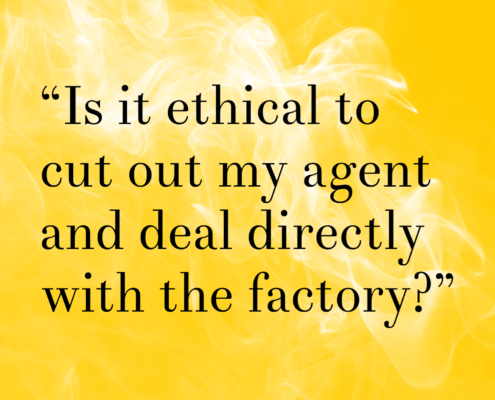Any sound business puts profit at the top of priorities. Often, quick profits obscure long-term decision making. Since our project management teams are based in China, I am often asked about China and business.
A recurring theme or question is “Since it has become easier to communicate via the Internet, is it ethical I to cut out my agent and deal directly with the factory?” While we are not a broker, I always pose the following response:
“Well it isn’t cool and it’s probably not smart.”
The reasons it’s not cool:
At one point or another, you needed someone to find something—either a product or supplier. You selected a China sourcing agent based on their years of relationships, ability to deliver these at a cost at quality that supported your business. Assuming you made or continue to make a profit, your agent has delivered on their commitment. The reason your agent is able to provide this value is the time, expertise and resources he/she brings to the table. So unless you are honest with this agent and tell them of your intentions, by most people’s standards you lack ethics. And that isn’t cool.
The reasons it’s not smart:
Something will eventually go wrong. Wrong color, wrong size, wrong quantity, wrong date, wrong quality, wrong cost. (I probably shouldn’t need to continue but just in case). Unless you have the years of relationships and ability to travel to and work with the factories, which requires time, expertise and resources, this isn’t smart.
Time to reflect…
Examine what is creating your intention to bypass your agent.
Are you under pricing pressure from a competitor?
Lay out the facts backed by evidence (documented cost reductions at retail or wholesale) and provide them with the means to discuss intelligently with the factory decision makers. If you haven’t thought of this or are too lazy to do your homework it’s not your agent’s fault.
Has the quality of the product from the factory changed from the originally agreed upon specifications?
Did you both create and agree to a finished product standard? If so the Quality Control inspection and documentation process should be straightforward. The product passes or it fails. And final payments should always be subject to the pre-shipment reports. If quality has become the main issue, give your agent an opportunity to find alternate sources.
Is your sourcing agent no longer providing value?
What do you expect of your agent after they have found your products and supplier? Have you been clear about this? Do you have a basic list of mutually agreed upon terms of service? For example, say the quality of a shipment is unacceptable. The question then might be, “Was my agent involved and engaged (perhaps even performed) the Pre-Shipment Inspection?” If it was agreed upon or the agent said they would be doing this and did not or missed critical details, this very strong support for discontinuing your relationship with him/her.
3 Things to Consider:
- Carefully weigh all the facts before any change in strategy.
- Develop a long-term strategic path for any buy/sell business that relies on China suppliers.
- Create a well-purposed, clearly detailed and signed off document trail that exists between your agent as well as the factories. Don’t be lazy on this part. This includes product specific QC checklists, payment terms, product release and purchase order requirements and services to be provided by the China agent.
In conclusion
Karma can get us all in the long run. If you think cutting your China rep out to make a few extra bucks is a good idea just wait and see how much it will cost to fix a problem with no one on the ground.










Follow Us